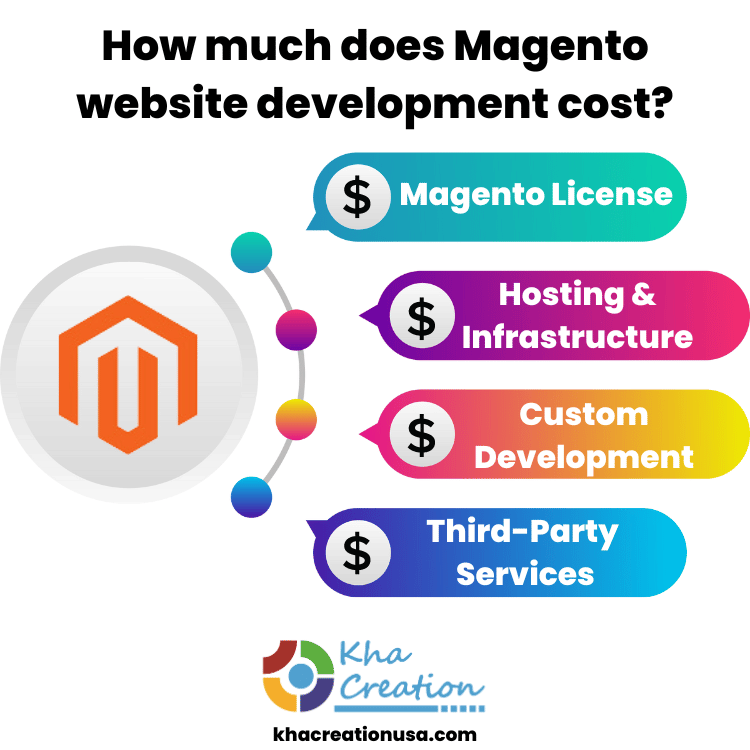Magento Website development is an essential aspect of e-commerce website development that can help businesses thrive in the competitive online marketplace.
For US-based businesses looking to outsource or develop a website for their business, Magento platform offers a robust and scalable solution to build and maintain their e-commerce store.
With the increasing demand for online shopping, having a professionally designed and developed Magento website can help businesses increase their online visibility, reach a wider audience, and boost their sales revenue.
In this article, we’ll discuss the benefits of Magento website development and why it’s crucial for US-based businesses to consider Magento website platform for their e-commerce website needs.
Whether you’re a small business owner or an established enterprise, this article will provide valuable insights into Magento website development and how it can transform your online presence.
Let’s start with Basics.
What is Magento?
Magento is a powerful and versatile open-source e-commerce platform that offers businesses of all sizes the ability to build and manage their online stores with ease.
Originally released in 2008, Magento has undergone several significant updates and improvements over the years to become one of the most popular e-commerce platforms in the market.
Magento was founded by Roy Rubin and Yoav Kutner, who saw the need for an e-commerce platform that could provide businesses with the flexibility and customization options they needed to succeed online.
The platform quickly gained traction and was acquired by eBay in 2011. After being sold to private equity firm Permira in 2015, Magento continued to evolve and expand its capabilities.
Today, Magento website is used by over 250,000 merchants worldwide, making it one of the most widely adopted e-commerce platforms available. Its robust feature set includes advanced catalog management, flexible pricing and promotions, customizable checkout options, and support for multiple payment gateways and shipping methods.
One of the key benefits of Magento website is its ability to scale a business as it grows.
Whether you’re just starting out or managing a large enterprise-level store, Magento can provide the features and functionality you need to meet your business goals.
Additionally, Magento’s open-source nature means that developers can customize and extend the platform to meet the specific needs of their clients.
In recent years, Magento has continued to evolve with the changing needs of the e-commerce market. The platform now offers a cloud-based version, Magento Commerce Cloud, which provides businesses with a fully managed hosting solution for their online store.
Additionally, Magento has made significant investments in improving the platform’s performance and user experience, making it easier than ever for businesses to create a seamless and engaging online shopping experience for their customers.
Adobe acquired Magento in May 2018 for $1.68 billion, making it a part of the Adobe Experience Cloud.
The acquisition was a strategic move by Adobe to expand its offerings in the e-commerce market and provide businesses with a comprehensive set of tools to manage their online presence.
The integration of Magento into the Adobe Experience Cloud has allowed businesses to seamlessly connect their e-commerce platform with other marketing and analytics tools, providing a holistic view of their online operations.
Since the acquisition, Adobe has continued to invest in the development of Magento, adding new features and capabilities to further enhance the platform’s functionality and user experience.
Let’s also go through the commonly asked questions about Magento
Is Magento Website a good e-Commerce Platform?
Yes, Magento is a good e-commerce platform for businesses of all sizes and industries. Its flexibility and scalability make it an ideal choice for businesses that need a custom solution for their online store. Additionally, Magento’s extensive feature set provides businesses with the tools they need to manage their e-commerce operations, from catalog management to checkout and payment processing. While Magento may require more technical knowledge than some other e-commerce platforms, its robust capabilities and open-source nature make it a top choice for businesses looking to sell online.
Is Magento Website a CMS?
While Magento website platform does offer some content management features, it is primarily an e-commerce platform rather than a CMS. Magento’s CMS capabilities allow businesses to manage content like product descriptions, category pages, and static pages on their e-commerce website. However, its primary focus is on providing tools for managing and selling products online.
Is Magento dying?
No, Magento is not dying. Despite some rumors and speculation about the platform’s future, Magento remains a popular and widely used e-commerce platform. In fact, the platform’s adoption has continued to grow in recent years, with businesses of all sizes and industries choosing Magento for their online stores. While there are other e-commerce platforms available, Magento’s flexibility, scalability, and robust feature set continue to make it a top choice for businesses looking to sell online.
What do Magento Website developers do?
A Magento developer is responsible for website development, maintaining, and customizing Magento e-commerce websites. They typically work with a team of designers, project managers, and other developers to build and deploy online stores that meet the specific needs of clients. Magento developers must have a strong understanding of the Magento platform, as well as web development technologies like HTML, CSS, JavaScript, and PHP. They are also responsible for integrating third-party systems like payment gateways, shipping providers, and other e-commerce tools.
Is Magento headless?
Yes, Magento can be used as a headless e-commerce platform. With the release of Magento 2, the platform introduced support for headless architecture, allowing developers to use Magento as a back-end service for building custom front-end experiences.
This approach offers greater flexibility and control over the user experience, allowing businesses to create unique and personalized online stores.
Additionally, a headless approach can help improve website performance and provide better mobile experiences by enabling the use of modern web technologies like Progressive Web Apps (PWA). Overall, Magento’s headless capabilities make it a versatile platform for building custom e-commerce experiences that meet the specific needs of businesses and their customers.
What is Magento’s presence in the USA?
Magento has a significant presence in the USA, with many businesses of all sizes and industries using the platform to power their e-commerce operations. According to BuiltWith, as of April 2023, there are over 32,000 active Magento websites in the USA.
This includes many notable brands such as Nike, Coca-Cola, and Nestle, as well as small and medium-sized businesses across a wide range of industries.
Magento’s popularity in the USA can be attributed to its flexibility, scalability, and robust feature set, which allows businesses to create custom e-commerce experiences that meet their specific needs. Additionally, Magento’s open-source nature and large developer community provide businesses with access to a wide range of resources and tools for building and maintaining their online stores. With Adobe’s acquisition of Magento in 2018, the platform’s presence in the USA has only grown, as businesses now have access to additional resources and integration capabilities through the Adobe Experience Cloud. Overall, Magento’s presence in the USA is significant and continues to grow as more businesses choose the platform for their e-commerce needs.
How much does Magento website development cost?
The cost of using Magento in the United States can vary depending on a variety of factors, including the size and complexity of the e-commerce store, the hosting and infrastructure required, and any additional features or integrations needed. Here are some of the key costs associated with using Magento:
Magento License for Website Development:
Magento offers two editions of its platform – Magento Open Source (formerly Community Edition) and Magento Commerce (formerly Enterprise Edition). Magento Open Source is free to use, while Magento Commerce requires a license fee. The cost of a Magento Commerce license can vary based on a variety of factors, but generally starts at $22,000 per year.
Hosting and Infrastructure:
In addition to the Magento license, businesses using the platform will also need to consider the cost of hosting and infrastructure. This can include costs for server hardware, cloud hosting, and ongoing maintenance and support.
Custom Development:
Depending on the complexity of the e-commerce store, businesses may need to invest in custom development work to tailor the platform to their specific needs. This can include the development of custom themes, modules, or integrations, which can add to the overall cost of using Magento.
Third-Party Services:
Finally, businesses may also need to consider the cost of any third-party services or integrations required for their e-commerce store. This can include payment gateways, shipping providers, and other e-commerce tools, which can add additional costs to the overall platform.
The cost of using Magento in the United States can vary widely depending on the specific needs and requirements of the business. It’s important for businesses to carefully consider all of the associated costs before committing to the platform to ensure that it aligns with their budget and goals.
 How does Magento Website Development works?
How does Magento Website Development works?
Here are steps in brief on how Magneto works
Magento Installation and Setup:
Magento is a self-hosted platform, which means businesses will need to install and set it up on their own servers or cloud hosting platform. Once installed, businesses can begin customizing the platform to their specific needs.
Catalog Management:
One of the key features of Magento is its powerful catalog management system, which allows businesses to manage their products, categories, and pricing. Businesses can create and manage product attributes, set up pricing rules and discounts, and create and manage product categories.
Order Management:
Magento also provides robust order management tools, allowing businesses to manage orders, invoices, and shipments. Businesses can set up multiple payment and shipping methods, track inventory levels, and manage customer returns and refunds.
Customization and Integration:
Magento is highly customizable and allows businesses to create custom themes and extensions to tailor the platform to their specific needs. Additionally, Magento supports a wide range of third-party integrations, including payment gateways, shipping providers, and other e-commerce tools.
Performance and Scalability:
Finally, Magento is designed to be scalable and performant, allowing businesses to handle large volumes of traffic and sales. The platform supports caching, indexing, and other performance optimization techniques to ensure fast page load times and a smooth user experience.
Magento works by providing businesses with a robust and customizable e-commerce platform that allows them to create and manage online stores that meet their specific needs.
Why is Magento Website better than WooCommerce Website?
When it comes to choosing an e-commerce website development for your business, Magento and WooCommerce are two of the most popular options. Here’s a comparison of the two platforms in terms of functionality, scalability, and reliability:
Functionality:
Magento website is a more robust platform compared to WooCommerce. It offers a wide range of features and functionalities out of the box, including advanced catalog management, complex pricing rules, and sophisticated order management tools. Magento also offers a wide range of third-party extensions and integrations, allowing businesses to customize and extend the platform as needed.
WooCommerce, on the other hand, is a more lightweight platform designed for smaller online stores. While it does offer some advanced features and integrations, it may not be as suitable for businesses with more complex needs.
Scalability:
Both Magento and WooCommerce are scalable platforms that can handle large volumes of traffic and sales. However, Magento is generally considered to be more scalable than WooCommerce. Magento offers advanced caching and indexing techniques, as well as a highly optimized codebase, allowing it to handle large numbers of products and customers with ease. WooCommerce can also handle large volumes of traffic and sales but may require additional optimization and infrastructure as the business grows.
Reliability:
Both Magento and WooCommerce are reliable platforms that offer high levels of uptime and performance. However, Magento is considered to be more reliable than WooCommerce, particularly for larger online stores. Magento offers advanced features like database sharding and load balancing, allowing it to handle large volumes of traffic and sales without any performance issues. WooCommerce can also be reliable but may require additional optimization and infrastructure as the business grows.
While both Magento and WooCommerce are popular e-commerce platforms, Magento is considered to be more suitable for larger, more complex online stores due to its advanced features and scalability. However, for smaller online stores with more basic needs, WooCommerce may be a more cost-effective and easier-to-use option.







